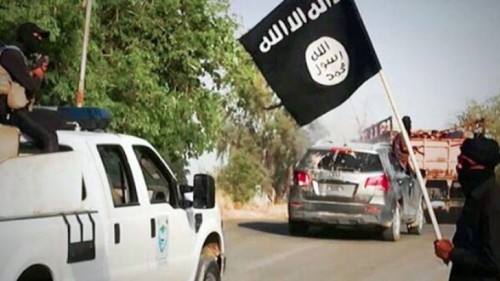The Obama administration is reportedly considering sending up to 100 special forces troops to advise and train Iraqi troops who are fighting a desperate battle against Al Qaeda-inspired Sunni Muslim insurgents in that country’s north and west.
The Associated Press, citing three U.S. officials, reported early Tuesday that the White House was weighing the option. It’s not clear how quickly the special forces could arrive in Iraq. It’s also unknown whether they would remain in Baghdad or be sent to the nation’s north, where the Sunni Muslim insurgency Islamic State in Iraq and the Levant (ISIS) has captured large swaths of territory ringing Baghdad, the capital of the Shiite-led government.
The troops would fall under the authority of the U.S. ambassador in Baghdad and would not be authorized to engage in combat, another U.S. official said. Their mission would be “non-operational training” of both regular and counterterrorism units, which the military has in the past interpreted to mean training on military bases, the official said.
The White House would not confirm that special operations forces were under consideration. But National Security Council spokeswoman Caitlin Hayden said that while Obama would not send troops back into combat, “He has asked his national security team to prepare a range of other options that could help support Iraqi security forces.”
Meanwhile, 170 armed troops have arrived in Baghdad to “provide support and security for U.S. personnel and the U.S. Embassy,” according to a White House statement. About 100 additional forces are being put on standby, most likely in Kuwait, and could be used for airfield management, security and logistics support, officials said.
Obama says the forces, which are entering Iraq with the consent of the nation’s government, are equipped for combat and will remain until the security situation becomes such that they are no longer needed.
Iraqi forces have struggled to contain the ISIS insurgency, despite having the advantage in numbers and weaponry. The BBC reported Tuesday that clashes were taking place in parts of the city of Baquba, approximately 40 miles north of Baghdad, though Iraqi forces were reportedly in control of the city.
In Tal Afar, west of the ISIS-held city of Mosul, the BBC reported that government forces had been reinforced in their efforts to recapture the city, which fell to insurgents before dawn Monday. The BBC reported that the Iraqi air force was carrying out airstrikes in the area.
Senior U.S. Defense officials confirmed to Fox News that Syrian war planes struck two separate convoys belonging to the insurgent Islamic State of Iraq and Syria on Saturday.
According to sources familiar with the incident, the Syrian planes struck with the help of Iranian intelligence. There is no bomb damage assessment from the attack, but it is the first time there have been reports of Syrian warplanes having crossed into Iraq since the ISIS offensive began a week ago.
The crisis has sparked a rare alignment of interests between the U.S. and Iran, which wants to preserve Iraq’s Shiite-dominated government. The U.S. and Iran are engaged in sensitive nuclear negotiations and used a round of talks Monday in Vienna, Austria, to hold a separate bilateral discussion on Iraq.
While the U.S. and Iran have similar short-term goals in Iraq, they have different long-term aims. The United States would like to see an inclusive, representative democracy take hold in Iraq, while predominantly Shiite Iran is more focused on protecting Iraq’s Shiite population and bolstering its own position as a regional power against powerful Sunni Arab states in the Gulf.
It’s unclear what type of cooperation the U.S. and Iran could undertake. Secretary of State John Kerry said in an interview with Yahoo! News that the U.S. would “not rule out anything that would be constructive,” though U.S. officials quickly tamped down speculation that the discussion might include military coordination or consultation.
While the White House continues to review its options, Iran’s military leaders are starting to step into the breach.
The commander of Iran’s elite Quds Force, Gen. Ghasem Soleimani, was in Iraq on Monday and consulting with the government there on how to stave off insurgents’ gains. Iraqi security officials said the U.S. government was notified in advance of the visit by Soleimani, whose forces are a secretive branch of Iran’s Revolutionary Guard that in the past has organized Shiite militias to target U.S. troops in Iraq and, more recently, was involved in helping Syria’s President Bashar Assad in his fight against Sunni rebels.
Source: Foxnews
[AdSense-A]















































































































































































































































![[Video] Chicago Police Officers Caught On Video Telling Two Black Men "We Kill Mother F**kers"](https://earhustle411.com/wp-content/uploads/2018/07/evil-cop-3-300x180.jpg)
![[Video] Chicago Police Officers Caught On Video Telling Two Black Men "We Kill Mother F**kers"](https://earhustle411.com/wp-content/uploads/2018/07/evil-cop-3-80x80.jpg)












![[Video] White Woman Calls The Cops On Black Real Estate Investor, Cops Threaten To Arrest Her For Harassing Him](https://earhustle411.com/wp-content/uploads/2018/05/nosy-neighbor-300x180.png)
![[Video] White Woman Calls The Cops On Black Real Estate Investor, Cops Threaten To Arrest Her For Harassing Him](https://earhustle411.com/wp-content/uploads/2018/05/nosy-neighbor-80x80.png)


![White Scientist Says The Black Community Is Being Targeted By The Medical System, They Are Deliberatly Being Poisoned [Video]](https://earhustle411.com/wp-content/uploads/2016/05/mike-adams-300x180.jpg)
![White Scientist Says The Black Community Is Being Targeted By The Medical System, They Are Deliberatly Being Poisoned [Video]](https://earhustle411.com/wp-content/uploads/2016/05/mike-adams-80x80.jpg)








![Teenage Girl Shot In Her Stomach Three Times But Took Time To Post To Facebook [ Video]](https://earhustle411.com/wp-content/uploads/2016/02/Gangster-chick-300x180.jpg)
![Teenage Girl Shot In Her Stomach Three Times But Took Time To Post To Facebook [ Video]](https://earhustle411.com/wp-content/uploads/2016/02/Gangster-chick-80x80.jpg)







